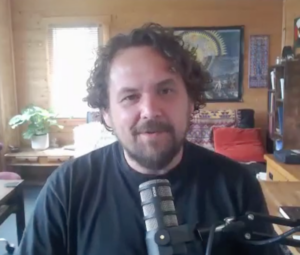Podcast: Play in new window | Download (Duration: 1:12:39 — 83.2MB)
 There are many stories in the mainstream narrative that claim to be based on science. So when we keep finding these stories to be falsified by available evidence, we can safely draw the conclusion that science is being evoked in order to persuade people to believe the story, without any genuine science being performed. But more than this, after busting myths about climate change, the alleged pandemic, the alleged moon landings and even the existence of viruses, we get the picture that what passes for modern science is nothing of the sort.
There are many stories in the mainstream narrative that claim to be based on science. So when we keep finding these stories to be falsified by available evidence, we can safely draw the conclusion that science is being evoked in order to persuade people to believe the story, without any genuine science being performed. But more than this, after busting myths about climate change, the alleged pandemic, the alleged moon landings and even the existence of viruses, we get the picture that what passes for modern science is nothing of the sort.
Steven Young is an ex-theoretical physicist. His first hand experience of studying it to PhD level gives him a unique perspective as an insider. Steve shares some of his many insights about theoretical physics, or quantum physics, and blows the lid off this much hyped, and widely believed in, source of false ideas. I noted Steve’s logical method and rational approach in dismantling the myths of Quantum physics, but I was extremely disappointed to learn that he is simultaneously a flat-earther, who readily drops the logical method and rational approach in embracing mystical ideas. This is the epistemological inconsistency that I have observed in many other people who also say they value truth, freedom and human flourishment.
Steven has said that he is genuinely trying to find out the truth, and only resorted to flat-earth belief because he couldn’t prove to himself that the earth was globular. Oddly enough, he has shunned attempts by myself and Patrik Holmqvist to assist him in his understanding. However, just because someone is wrong on one issue doesn’t undermine their sound logical arguments on another. In spite of Steven’s inconsistent epistemological method, his arguments against quantum physics are logical and persuasive. It is the method and the reasoning that reveal the truth or falsity of a particular claim, not the credibility of the speaker. So, epistemologically, there is no problem with accepting some of the ideas espoused by a particular invidual, while thoroughly rejecting others. The criterion for which ideas are true is always the epistemological method, and the particular reasoning in the constructed argument.
Given that most of us seasoned truth seekers are aware of the concept of controlled opposition, it is always worth being vigilant to this possibility with every voice we hear challenging the mainstream narrative, including my own. Its the arguments themselves that must be logically scrutinised, even if the protagonist is epistemologically inconsistent. [ For clarity, epistemological inconsistency means this: that reason and logic are used in one area of inquiry, and dispensed with entirely in another.] I have learned that the best metric to follow in judging any source of information, is that of epistemological consistency. This is why I have come to doubt voices like Dr Andrew Kaufman since he also began with rigorous logic in dismantling the virus myth, but then completely ditched his scientific standards of logic and reason to embrace a wide variety of mystical ideas that fly in the face of logic and reason. However, I still value his logical arguments against the existence of viruses, because they are sound.
There is great value in the words of Steven Young, as long as the listener continues to hold him to the epistemological standard of reason and logic. His insights in busting many of these myths that are labelled as ‘scientific’ is valid where he uses logic and reason. The challenge for the listener is to become sufficiently familiar with logical fallacies and other thinking skills covered on this website, to be best equipped to identify the truth.
In conclusion, Steven shares some very useful insights about the nonsense that is Quantum (or theoretical) physics. And busting this myth is important if you want to properly understand the context of what is going on today. To have an accurate world view, its important to grasp that terms like ‘scientific’ when appended to an idea in the mainstream narrative, is simply a marketing label to ‘sell’ the idea. And also we must bear in mind that belief in theoretical physics rests entirely on the false assumption that reality exists in mathematics. The truth is the other way around; mathematics exists in reality. Mathematics is a useful language for describing reality, but its rules to not govern reality. The second important takeaway is that the false ideas of theoretical physics and the ideas espoused by Einstein, prop up the illusion that the earth rotates around the sun, rubbishes aether theory, and has prevented genuine advancements in technology.
Feel free to join the conversation and leave a comment.
Nigel Howitt, September 2025
Leave a Reply